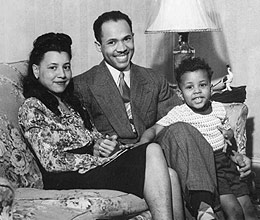
Eugene and Helene Allen with their son, Charles, in 1948
What caught my attention in Lee Daniels’ “The Butler” was not the character Cecil Gaines, played by Forest Whitaker, but rather his wife, Gloria, portrayed by Oprah Winfrey. In addition to the representation of a White House butler, the film depicts an African American wife and mother whose husband’s gainful employment allows her to remain home and rear the couple’s two sons: an anomaly in the portrayal of black women in the history of Hollywood movies. Many persons with whom I discussed the film overlook this fact. At the same time, this depiction of a black woman conjures up a salient and often contested aspect of black women’s history in the U.S. That is, there was, and continues to be, a cadre of stay-at-home black wives and mothers rearing their children, taking care of their husbands and partners, and being active in their communities and churches.
So while the film unveiled the life of the character Cecil Gaines, I was more intrigued by the development of his wife, Gloria, because too many Hollywood films continue to portray African American women as caricatures, mammies, and jezebels or some semblance of all three. I watched the Gloria character intently despite my ongoing disappointment with the inability of Oprah to produce a film that allows me a glimpse into the black life that rings true to my experience and my reservations about her acting (Am I the only person not enthralled by Oprah’s acting?).
As a former maid, Gloria recognizes how coveted the position is that her husband has landed at the White House. She reminds her neighbors “the White House called him” stressing the level at which Cecil has mastered the skill of being in a room without being noticed, anticipating a person’s needs, and speaking only when being spoken to: the criteria for being an excellent butler. Gloria’s elation soon gives way to anger and loneliness, which she attempts to mitigate with drinking and possibly an affair with a neighbor, as she loses her husband to his job.
Despite the film’s pat domestic ending, allowing viewers to depart the theater with the delusion that some progress has been made in race relations in the United States and in the representation of African Americans in Hollywood films, the film nonetheless stirs up complicated questions about wage disparity versus job security, generational alliances versus intergenerational conflicts, and the sacrifice of self and family for inclusion within the status quo and an opportunity to sit at the table. But what is more important to me is that Lee Daniels’ “The Butler” shatters a poignant stereotype of the black woman as mammy only to re-inscribe the black man as stepin fetchit, holding Cecil Gaines fast within a frame that keeps him passive, self-sacrificing, and more in love with the first families and their children than he is with his own son.
Despite the lecture about the potential subversiveness of the black domestic given by Dr. King in the film to a group of Freedom Riders, one of whom is Cecil Gaines’ son, I still await the day when filmmakers, other than Spike Lee, will produce a film with characters who resemble some of the black people whom I have known in my life, those persons who have truly been subversive and paid the price for their resistance.
(Photo Credit: History vs. Hollywood)